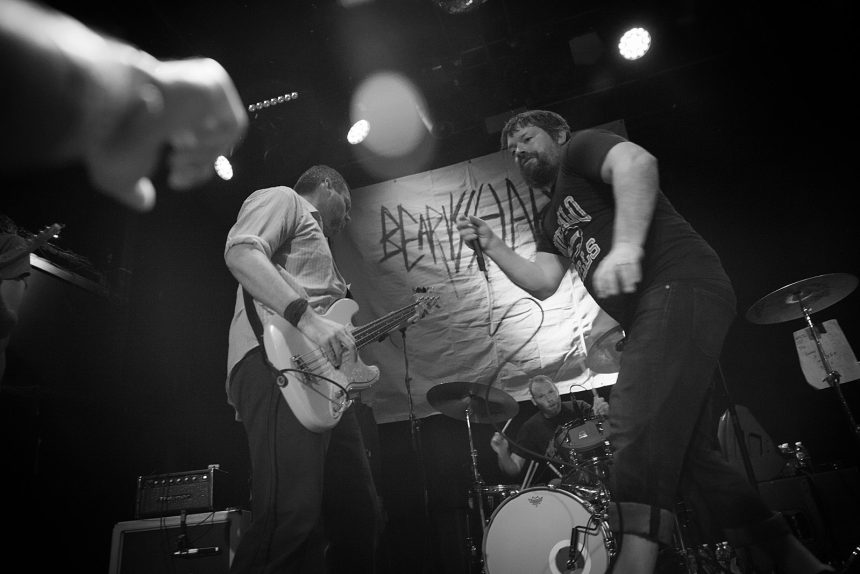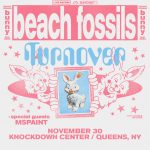As music lovers/nerds, we also love lists–making them and reading them. They’re not perfect, but they’re great tools for organization, discovery, and keeping the momentum going for art that we love in a world where almost all recorded music is at our fingertips. At the same time, ‘best-of’ style canonization tends to reinforce the same few albums over time and other gems start to fall by the wayside. To celebrate more of those gems, we’re starting up a new recurring list feature called 10 Underrated Classics Of, where we’ll be publishing a series of 10-album-long lists that do deep dives into various eras/genres and explore some of the records that we think could use a little more love. We’re not claiming these are the more underrated albums, and of course some will be more underrated than others, but we’re just excited to get to talk about some albums that the more unanimous “Top 10” style lists don’t always allow us to talk about.
Our first list is in the series is of a genre/era that is truly full of underrated gems, early 2000s emo. It’s an era that’s been stereotyped to death, with a handful of bands in a certain mold that got very popular around the same time, and that mold is the one we tend to see reinforced over and over again at Emo Nite and When We Were Young and other entities aimed at nostalgia for that very specific subset of emo bands. But there was so much more going on within early 2000s emo, from ’90s-emo alumni continuing to carve out their own paths to prescient bands paving the way for emo’s more indie rock-oriented fourth wave to artsy outliers who never fit with any trends, to various combinations of all three of those categories. “Underrated” is also relative; some of these albums sound like they could’ve gotten huge if the stars aligned differently, and others sound like they were built for the underground. Whatever the case, all of these albums hold up and deserve an even bigger boost than they’ve gotten so far.
Read on for the list, which goes from 2000-2004 in chronological order…

Hot Rod Circuit – If It’s Cool With You, It’s Cool With Me (2000)
If you were immersed in emo in the year 2000, Hot Rod Circuit actually seemed like they could be the next big thing. They were staples of a scene that was just on the cusp of experiencing a boost in popularity, and they generated a lot of interest from bigger labels after putting out 2000’s Triple Crown-released If It’s Cool With You, It’s Cool With Me. They ended up going with Vagrant, and their 2002 Vagrant debut Sorry About Tomorrow birthed what remains the band’s biggest song, “The Pharmacist.” A little pop punkier than their usual stuff, it was the album’s clear single, but even a streamlined anthem like that one couldn’t make Hot Rod Circuit as big as their labelmates Dashboard Confessional, Saves The Day, and Alkaline Trio were becoming around then. “The Pharmacist” is the one Hot Rod Circuit song a non-HRC head might know, and it’s a great song, but it’s just the tip of the iceberg of this band’s great discography. If It’s Cool With You, It’s Cool With Me, the album that boosted HRC’s profile in the first place, is up there with any of the canonized emo classics of the era, and you didn’t have to “be there” to realize how special it is.
Coming out in 2000, it’s caught right in between emo’s second and third waves, and it sounds like it. It has echoes of scrappy Midwest ’90s emo, and it’s pointed in the direction of the poppier, more melodramatic 2000s bands–it’s no surprise that they were cited as an influence by some of the bands who did end up dominating the radio. Andy Jackson was a singer/songwriter who mostly avoided clichés, Casey Prestwood was a Guitar Hero-worthy shredder and an uncontrolled force on stage, and the Connecticut-via-Alabama band always had a little twang in them, even before Casey launched his country career. It’s poppy and punky without being “pop punk.” It’s rawer and harder than Hot Rod’s later material but with just as much clarity and focus. It stands out from the pack of early 2000s emo bands while capturing so many of the same thrills associated with that era.

The Rocking Horse Winner – State of Feeling Concentration (2000)
Jolie Lindholm may be best known to many as the guest singer on multiple Dashboard Confessional albums, but her own band The Rocking Horse Winner was also great and a true underrated gem of that early 2000s emo era. The band also featured three members of the Florida melodic punk band As Friends Rust (one of whom also played in Poison The Well), and The Rocking Horse Winner gave them a chance to do something much lighter, more atmospheric, and with a sense of longing, which Jolie was perfect for. The songs on their debut album State of Feeling Concentration are rooted in the soaring, ballad-driven emo of Mineral, Clarity-era Jimmy Eat World, and early Death Cab, and like those bands, The Rocking Horse Winner really knew how to tap into delicate, gorgeous melancholy. It makes sense that Chris Carrabba (who was also in the short-lived band Red Letter Day with members of TRHW) took a liking to this as he was becoming the ambassador for the clean, pretty side of emo.
The Rocking Horse Winner toured with tons of the bands who blew up in that era, and they later signed to Equal Vision and released a split with labelmates Coheed & Cambria, but they never had the same fate as their peers. (As I write this, they have just over 600 monthly listeners on Spotify! A crime!) They also leaned more indie rock than some of their heavier, poppier peers, and though State of Feeling Concentration does sound very of its time, it also sounds more timeless today than some of the bands who were trendier in that era. It’s an album that begs to be rediscovered, and though you can’t see The Rocking Horse Winner live today, you can follow their new band The Darling Fire who are doing a lot of interesting stuff right now.

Rescue – Volume Plus Volume (2002)
At this point, math rock is built into emo’s DNA, and that’s largely because of the ’90s Kinsella bands and the late 2000s emo revival bands that carried the torch, but there were a handful of math-emo gems splintered throughout the early 2000s that kept that fire lit, and one of the most enduring is Detroit band Rescue’s 2002 debut LP Volume Plus Volume. On this LP, Rescue embraced all the frenetic, shapeshifting patterns of math rock, but they also wrote pop songs–or as close to pop as then-yelpy singer Alan Scheurman could get in those days. That combo is a winner when it’s done well, and Rescue did it really well. This album is a constant thrill for who love the chaos of math rock, and its hooks are so tangible that anyone can sing along, even people who don’t care about crazy time signatures.
I don’t know how much Rescue’s influence has carried over into later generations (though there’s at least one emo revival band who I’m pretty sure are named after a song from this album), but I do think that anyone who likes “Midwest emo” would like this record. It’s one of a kind, and even Rescue never made another record like it; they’d gradually tone down the mathiness on 2004’s Flamingo Minutes, and they transitioned into an indie/art rock band for their final album, 2006’s Paranoid. It’s all great stuff, but nothing in the world hits like Volume Plus Volume.

Breaking Pangaea – Phoenix EP (2003)
When Taking Back Sunday’s Tell All Your Friends lineup split, TBS brought in Fred Mascherino as their new secondary vocalist, guitar, and co-songwriter and Matt Rubano as their new bassist; while John Nolan, Shaun Cooper, and John’s sister Michelle formed Straylight Run with drummer Will Noon. Before that, Fred and Will had been playing together in the band Breaking Pangaea, and a lot of the same magic that Fred brought to TBS can be heard in this band. (Sometimes literally; parts of “Wedding Dress” from their 2001 debut album Cannon to a Whisper were reused on Taking Back Sunday’s “My Blue Heaven.”) Cannon to a Whisper was their only full-length, but its followup EP (and the band’s Equal Vision debut) Phoenix is Breaking Pangaea’s best record, and it’s a hugely important piece of the third wave emo puzzle that too often goes overlooked.
The EP’s clear highlight is opening track “Worst Part,” a super catchy emo-pop anthem that stands tall next to the hits of that era, but the rest of these songs are no slouches either. Breaking Pangaea effortlessly seesaw between the punchy, pop-punky stuff and the more cerebral stuff, and Fred’s voice is as iconic on this EP as it is on those TBS records. (Will’s drumming is also as beastly as it is in Straylight Run.) Phoenix feels even more underrated because of what Fred and Will went on to do, but even if this was the last thing they did, it would still be a major highlight of that era. These songs still hit like they did over 20 years ago.

The Jealous Sound – Kill Them With Kindness (2003)
This is one of the bigger albums on this list, but in a perfect world, The Jealous Sound would’ve been the next Jimmy Eat World or Weezer, so it has to count as underrated. Even in the ’90s, when most emo bands weren’t writing songs with huge choruses like emo bands in the 2000s would be, Blair Shehan was doing that in Knapsack, and his next band The Jealous Sound is as least as good–maybe better. I understand why Emo Nites play Yellowcard instead of Christie Front Drive or whatever, but if The Jealous Sound did get a bigger push 20 years ago, these songs would’ve been hits. The album’s a little top-heavy as far its hit potential goes, but pretty much any song on its first half really does sound like it could’ve torn up the radio in 2003–and that’s just because The Jealous Sound had a serious knack for pop songcraft, not because they were trying to sell out or fit in.
The latter half of Kill Them With Kindness is a little more pensive and atmospheric, and Jimmy Eat World of course had that too; you can’t have “The Middle” without “My Sundown” and you can’t have “Hope For Us” without “Recovery Room.” It’s an album with a ton of range, and the songwriting and production have both aged so well that it’s almost hard to believe this came out two decades ago.

Bear vs Shark – Right Now, You’re in the Best of Hands. And If Something Isn’t Quite Right, Your Doctor Will Know in a Hurry (2003)
It’s easy to get caught up in the perception of “’90s emo” vs “2000s emo,” but when you do too much of that, you risk overlooking a band like Bear vs Shark. When that new crop of raw, shouty, fidgety emo bands arose in the late 2000s, Bear vs Shark’s debut LP Right Now, You’re in the Best of Hands… was just as much of a widely-shared influence as Cap’n Jazz and Braid. This record came a few years later than those ’90s bands, but the groundwork it laid was just as important, and Bear vs Shark did it in a way that was entirely their own. They don’t sound like they’re trying to be Cap’n Jazz and Braid, and they definitely don’t sound like they were trying to fit on the early 2000s Equal Vision roster, to which they were in fact signed. They’re anomalies.
What you get on this album is a band that’s full of energy and so good at what they do. They’re a little messy but always in control. They’re loud but really know how to tone it down. They’re excellent musicians, and Marc Paffi’s strained, sometimes-slightly-out-of-key voice is iconic. Bear vs Shark are one of those bands who never got that big, but so many people who did hear them started bands, and even with their influence stretching far and wide, Right Now, You’re in the Best of Hands… still stands out from every pack.

Up Up Down Down Left Right Left Right B A Start – And Nothing Is #1 (2003)
“Midwest emo” of course gets its name because a lot of the pioneering bands in that style were from the Midwest, but when that style of music had its big comeback in the late 2000s, so many of the bands bringing it back were located in and around Pennsylvania. And yes, of course those bands were listening to the Midwest ’90s bands (and non-Midwest ’90s bands like Mineral, Jimmy Eat World, Sunny Day Real Estate, and Texas Is The Reason), but there was also a very crucial band right in their backyard that kept mathy Midwest-style emo alive throughout the early/mid 2000s: Haddon Heights, NJ’s Up Up Down Down Left Right Left Right B A Start. Singer/guitarist Steve Poponi and guitarist Dave Downham ran the Gradwell House studio that so many local bands recorded at, and threw shows in two of the studio’s earlier incarnations, creating a hub for the South Jersey DIY scene, and their own great band influenced so many younger bands coming up around that time.
Up Up Down Down’s mix of intricate guitars and Steve’s yearning vocals directly impacted other local bands like The Progress and Into It. Over It. (whose Evan Weiss played in UUDD for a time) and By Surprise (who were named after the final track on And Nothing Is #1), and through bands like those, they’ve indirectly inspired so many others. Steve sadly passed away this year at age 48, but he leaves behind a vast legacy and great music, including one of the early 2000s’ most uniquely great math-emo albums.

Northstar – Pollyanna (2004)
Northstar are one of those bands who existed just on the fringes of mainstream emo but they never really had a huge breakout moment of their own. Having become tight early on with Taking Back Sunday and having signed to New York label Triple Crown, they got immersed in the Long Island-centric emo boom despite hailing from Huntsville, Alabama. It’s easy to see why TBS liked them, and it’s hard to imagine TBS fans not liking them, but Northstar just never got that same push. There was definitely some mutual appreciation/influencing going on between Northstar and TBS specifically (and some impossible-to-ignore similarities between Nick Torres and Adam Lazzara’s voices), and Northstar’s second and final album Pollyanna scratches a very similar itch as the record that TBS released that same year (which Nick also sang on). Comparisons aside, Pollyanna stands tall as a great example of third wave emo and it’s aged a lot better than a lot of the albums that were more popular in real time.
Produced by Matt Squire (who would go on to become an in-demand producer for huge emo/pop punk bands like Panic! at the Disco and All Time Low), Pollyanna polished up the edges of Northstar’s endearingly raw debut Is This Thing Loaded? and leaned into the band’s pop side without losing an ounce of the band’s original charm. Pollyanna embraced the melodramatic teenage poetry of the era without crossing over into self-parody, and their musical arrangements remained more interesting than the bands who latched fully onto pop punk. They had grooves, rhythmic variety, and gorgeous guitar arpeggios that tied directly back to their roots in ’90s emo, as so many of their peers were blurring those ties. Pollyanna is an album by a band who respected where they came from but weren’t afraid to push forward and embrace change.

Piebald – All Ears, All Eyes, All the Time (2004)
In the grand scheme of things, even Piebald’s 2002 masterpiece We Are the Only Friends We Have is underrated, but since that album does get a lot of love in a cult-classic sense, I’m using this list to shed more light on its almost-as-good followup, All Ears, All Eyes, All the Time. It captures a lot of the same magic as its predecessor, which is to say it’s what happens when some kids from the Boston hardcore scene make smart, clever, quirky power pop (which ends up counting as emo — I don’t make the rules). It ranges from poppy punk ragers (“The Jealous Guy Blues”) to Beatlesque piano pop (“Haven’t Tried It”), but usually exists in some delightfully weird middle ground between those two extremes. It has the energy and strong backbone of a band who came up in punk, and an onslaught of infectious choruses.
Like a lot of the bands on this list, Piebald were misfits who existed (and still exist) in a lane of their own. Not that they’re entirely obscure, but being into them feels like being in some kind of secret–that’s why they inspire such rabid fandom. Like We Are the Only Friends We Have, All Ears, All Eyes, All the Time is a fun, lighthearted party on the surface with layers of depth beneath. It may sometimes live in the shadow of its predecessor, but it doesn’t pale in comparison.

Slingshot Dakota – Keener Sighs (2004)
Before Slingshot Dakota became the iconic piano/drums duo of Carly Comando and Tom Patterson and got immersed in the Pennsylvania “emo revival” scene, they were born on Long Island with Carly and Latterman members Jeff Cunningham on co-vocals/guitar and Pat Schramm on drums. That lineup only released one album, 2004’s Keener Sighs, and then Carly and Tom carried Slingshot Dakota into the future as Jeff and Pat spent more time in Latterman and later formed Bridge and Tunnel together, but Keener Sighs remains a relatively hidden gem that’s unlike anything else its three members have made.
On this album, they sound kind of sound like a cross between Rainer Maria and Straylight Run, with songs ranging from Midwest-style emo anthems (“Lost Notes and Seared Hopes”) to piano ballads (“It Wouldn’t Be”) to alt-country (“I’ll Leave the Toasts to the Bartender”), with lots of other cool stuff in between. Carly and Jeff’s voices sound great together, and this album is full of words and melodies and intonations that tug at the heartstrings. Slingshot didn’t cross my radar until the Carly/Tom era–an era that’s full of so many gems of its own–but if I knew Keener Sighs in 2004, it would’ve been right up there with all the heart-on-sleeve third wave emo I was eating up at the time. And the first time I did hear it, it brought me right back to those days.









